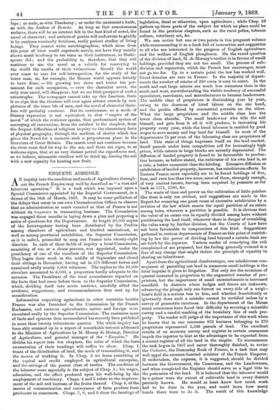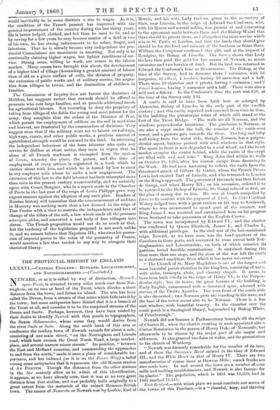A N inquiry into the condition andneeds of Agriculture throughout the
French Empire may well be described as "a vast and laborious operation." It is a task which was imposed upon a Special Commission appointed by the Imperial Government, in a decree of the 18th of March, 1866. It may be some palliation of the delays that occur in our own Circumlocution Offices to observe that an administration so much vaunted as that of France is not without its longueurs in transacting business. The Commission was engaged three months in laying down a plan and preparing a series of questions for the Departments. At length 20,600 copies of the Interrogatory having been distributed by the Prefas among chambers of agriculture and kindred associations, as well as among provincial notabilities, the Superior Commission, as it is called, proceeded to map out France into twenty-eight districts. In each of these fields of inquiry a local Commission, consisting of ten or a dozen persons, was appointed, under the presidency of one of the members of the Superior Commission. They began their work in the middle of September and closed their sittings in December, having sat in 270 different towns and examined orally nearly 4,000 witnesses. The replies to the 20,000 circulars amounted to 6,000, a proportion hardly adequate to the occasion. The Presidents of the local commissions reported on the facts that had come before them to the Superior Commission, which, dividing itself into seven sections, carefully sifted the evidence, suggestions, and recommendations thus sent up for consideration.
Information respecting agriculture in other countries besides France was also furnished to the Commission by the French Embassies, and eminent agriculturists native and foreign were examined orally by the Superior Commission. The enormous mass of facts and opinions thus accumulated has recently been published in more than twenty voluminous quartos. The whole inquiry has been ably summed up in a report of remarkable interest addressed to the Minister of Agriculture by M. Monny de Mornay, Director of Agriculture, and general manager of the " EnquOte." He divides his report into ten chapters, the value of which the bare enumeration of their headings will suffice to show. Chap. 1 treats of the distribution of land, the mode of transmitting it, and the means of working it. In Chap. 2 we learn something of the capital and credit employed in agricultural enterprise, and the savings of the poorer claw of rustics. The condition of the labourer more especially is the subject of Chap. 3; his wages, education, and the effect produced upon his well-being by the employment of machinery. Chaps. 4 and 5 relate to the improvement of the soil and increase of the fruits thereof. Chap. 6, of the means of communication and conveyance of farm produce from producers to consumers. Chaps. 7, 8, and 9 show the bearings of legislation, fiscal or otherwise, upon agriculture ; while Chap. 10 gathers up those parts of the subject for which no place could be found in the previous chapters, such as the rural police, tobacco culture, veterinary art, &c.
We can notice but one or two points in this pregnant volume while recommending it as a book full of instruction and suggestion to all who are interested in the progress of English agriculture and the welfare of English ploughmen. On the vexed question of the division of land, M. de Mornay's verdict is in favour of small holdings, provided they are not too small. The process of subdivision and separation, which the French law encourages, must not go too far. Up to a certain point the law has worked welt. Great domains are rare in France. In the majority of departments the number of estates of 250 acres is easy to count. In the north and east large estates are much less numerous than in the south and west, notwithstanding the visible tendency of successful speculators, merchants, and manufacturers to become landowners. The middle class of proprietors is diminishing year by year,, owing to the dearness of hired labour on the one hand, and the profits offered by commercial pursuits on the other. What the large proprietors and the middle class lose the lower class absorbs. The small landowner who tills the soil himself, and gets from it all it will produce, is increasing his. property every year, while the hired labourer is enabled by good wages to save money and buy land for himself. In most of the departments 75 per cent. of the labouring class are proprietors of land. This state of things impresses itself on the land market. Small parcels under keen competition sell for increasingly high prices, while estates in large blocks are actually depreciated. The diffusion of landed property is found to be favourable to production because, as before stated, the cultivator of his own land is, as. a rule, a better economist than the hireling. Excessive diffusion orsubdivision of landed property, however, has mischievous effects. In Eastern France more especially are to be found holdings of five, four, and even less than two acres, some of them, strangely enough, of very ancient tenure, having been acquired by peasants as far back as 1571, 1580, &c.
The waste of time and power on the cultivation of little patches. like these is only too evident, and suggestions are made in the Report for removing one great cause of excessive subdivision by a. revision of the law which enacts the equal partition of an estate among heirs, wherever a partition is possible. It is obvious that, the value of an estate can be equally divided among heirs without. partitioning the land itself, whenever there is danger of crumbling the value away by further division, but the Courts of Law have not been favourable to compromises of this kind. Suggestions. gathered in various departments of France on this point of restricting by law the power of dividing land beyond a certain limit are set forth by the reporter. Various modes of remedying the evil. complained of are proposed, but the feeling generally evinced is a fear of any change that might violate the principle of equality in sharing an inheritance.
Apart from the agricultural disadvantages, one mischievous consequence of parcelling out land in numerous small holdings is the fatal impulse it gives to litigation. Not only are the occasions of quarrel increased in proportion to the augmented number of proprietors, but the importance of small encroachments is increased manifold. In districts where hedges and fences are unknown, advancing the plough only one furrow on every side of a neighbour's field is a serious loss to him, and whether fraudulently or ignorantly done such a mistake cannot be rectified unless by a survey of geometric exactness. In the department of the Meuse many communes have faced this difficulty by securing a scientific: survey and a careful marking of the boundary line of each property. The reader will judge of the importance of this work when. he knows that in one commune 832 hectares belonging to 270 proprietors represented 5,348 parcels of land. The excellent results of an accurate survey and register in certain communes. impels the reporter to hint at the advantages to be expected from. a correct register of all the laud in the empire. To recommence the task begun in 1807 and never thoroughly finished, to revise the Cadastre, the Domesday Book of France, is a task that may well appal the stoutest-hearted minister of the French Emperor.. If undertaken, the expense, it is suggested, should be divided between the Government, the Communes, and the Landowners,. and when completed the Register should serve as a legal title to. the possession of the land. It is believed that the labourer would be a gainer were the extent of cultivable land in every district precisely known. He would at least know how much work. had to be done in the year, and could learn how many hands there were to do it. The result of this knowledge
would inevitably be in some districts a rise in wages. As it is, the condition of the French peasant has improved with the general improvement of the country during the last thirty years. He is better lodged, clothed, and fed than he used to be, and as by saving for a few years he may become master of a field or two of his own, he has strong inducements to be sober, frugal, and laborious. That he is already become very independent the provincial Commissions are unanimous in asserting. Not only is he continually claiming higher wages, but lighter conditions of service. Strong arms, willing to work, are scarce in the labour market. Many causes have brought this about, the development of a higher kind of tillage (demanding a greater amount of labour than of old on a given surface of soil), the division of property, the extension of public works and of military service, the migration from villages to towns, and the diminution of children in
The Commission of Inquiry does not favour the doctrines of Malthus, but suggests rather that rewards should be offered to peasants who rear large families, and so provide additional hands for agricultural labours. Not venturing to deny the propriety of taking from tillage of the fields the young and most robust for the army, they complain that the orders of the Minister of War, which permit the employment of soldiers on the soil in seed-time and harvest, are frustrated by the commanders of divisions. They suggest even that if the military were set to labour on railways, highways, canals, and other public works, a precious amount of agricultural strength would be restored to the land. In criticizing the independent behaviour of the farm labourer who quits any service he dislikes at short notice, they seem to regret that he alone of all French workmen is exempted from the system of &refs, whereby the place, the person, and the time of employment of every artisan is registered in a book which lie carries about with him, and which he is bound by law to show to any employer with whom he seeks a new engagement. The extension of this law to the field labourer has been attempted more than once in the present century unsuccessfully, and we certainly agree with Count Beugnot, who in a report made to the Chamber of Peers in the last year of the reign of Louis Philippe gave very cogent reasons against the adoption of any such plan. Readers of Russian history will remember that the commencement of serfdom in Muscovy was nothing more than a law decreed in the reign of Tsar Feodor wfth a view to restrain the independence and love of change of the tillers of the soil, a law which made all the peasants adscriptos glebm, and converted a vast body of free villagers into slaves. The French proposition would not do so much as that, but the tendency of the legislation proposed is not much unlike it, and we cannot believe that Napoleon Ill., who owes his possession of imperial power to the votes of the peasantry of France, would sanction a law that tended in any way to abrogate their cherished liberty.



































 Previous page
Previous page